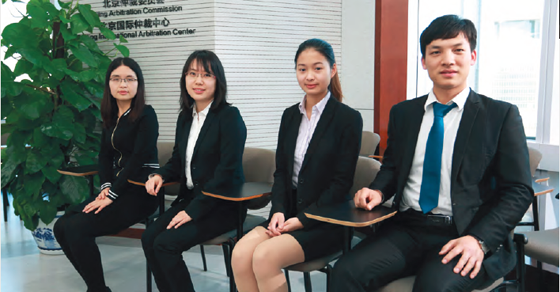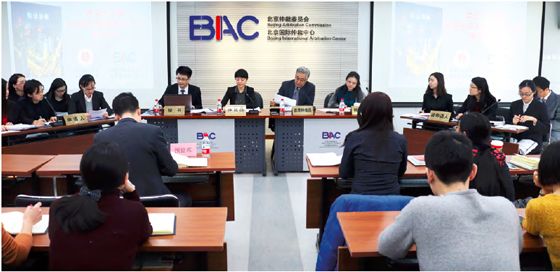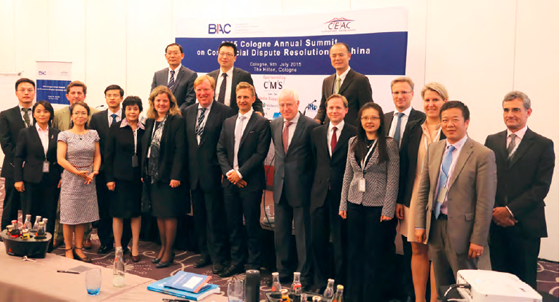
Publish time: Fri Aug 12 15:35:36 CST 2016
“In 2015, the steep rise in the number of arbitration cases has created practical difficulties for BAC as we have limited staff members. Nonetheless, with the joint efforts of our staffs and arbitrators, both the number of cases and the amount in dispute have hit a record high in 2015!”Mr. Lin Zhiwei, Secretary General of the Beijing Arbitration Commission/ Beijing International Arbitration Center (“BAC”), described the work of BAC in 2015 during an interview with us.
In 2015, BAC handled2944 cases, representing an increase of 44.2% over 2014. The total sum of amount in dispute reached 41.11 billion Yuan (RMB¥), an increase of 157.9% from 2014. BAC, as a Shiye Danwei (Institutional Unit) with only 43 staff, has a gross income of about 236.8 million Yuan in 2015 and contributed 51.11 million Yuan in taxes. From its establishment on the 28 September 1995 until the end of 2015, BAC has contributed a total sum of 222.5 million Yuan in taxes, which is 49.91 times the amount of start-up fiscal allocations in the early years of its establishment.
Following the enactment and implementation of Arbitration Law in 1995, the arbitration industry in China had made considerable progress. Under this trend towards growth and expansion, however, BAC remains to be one of the leaders in arbitration industry in China due to its credibility and quality of its services. Through BAC, we are able to see what competencies and core values are required for arbitral institutions to maintain a good reputation and degree of influence domestically and internationally.
Highly specialized arbitrators
There is a well-known saying in the field of arbitration: “arbitration is as good as the arbitrators”. At BAC, one of our greatest assets is the excellent team of arbitrators we have. They form the key guarantee for the healthy, rapid and future development of BAC. One of the job duties of孙君(Xunjun), a staff at the administrative department of BAC, is receiving arbitrators to the BAC at the front desk. Her main reflection of 2015 is that there is an apparent increase in the number of arbitrators attending hearings.
In 2015, there were 506 individuals listed on BAC’s Panel of Arbitrators, 359 of which handled arbitration cases. 2425 cases were resolved through means of arbitral award, mediation and settlement negotiation. A point worth mentioning is that, in relation to forming the arbitral tribunal, 852 arbitrators were selected by the parties themselves, an increase compared to 2014.
Mr. Lin Zhiwei further explained: “on the one hand, we can see that the ratio of parties taking the initiative to select their own arbitrator/s in arbitration cases is on the rise. This demonstrates that the impartiality, professionalism and quality of service of BAC’s arbitrators continue to receive better recognition. On the other hand, in relation to arbitrators appointed by BAC, we are also working to devise a scientific and systematic distribution for the appointment of arbitrators. We would like to take into consideration, not only the arbitrators’ professional experience and the competition of their ongoing arbitration workload, but also the effectiveness and diversity in the composition of the arbitral tribunal. By combining the senior arbitrator with the less experienced, we create dynamic teams that give arbitrators enormous reciprocity in sharing expertise. We strive to ensure that we have the most suitable and professional arbitrators for each case.”
One distinctive feature of BAC is the stringent requirement employed in the management of arbitrators. “If we find that an arbitrator is not sufficiently professional, we may cease his or her eligibility of being BAC’s arbitrator. Although this may seem normal among the international arbitration community, such practice is in fact difficult to uphold in Chinese cultural background.” Dr. Chen Fuyong, the Deputy Secretary-General of BAC, thinks that such “perseverance” is of great value to BAC. All new arbitrators appointed by the BAC must go through 3 days of intensive trainings and examinations, which focus on practical skills and involve workshops such as arbitration moot.
Dr. Chen Fuyong’s opening line for the trainings is always “we thank you for participating in this arbitrator's training." Such gratitude is expressed sincerely. Dr. Chen explained that many arbitrators who are experts in their specific fields were not fond of these trainings when they were first promoted. Besides, attending the trainings does not guarantee the attendants’ a place as an arbitrator at BAC. Many individuals wonder why they have not been enrolled in BAC’s panel despite having participated in the trainings for years. They were uncertain about the selection requirements. In fact, the requirements are simple and the details are contained in BAC’s Administrative Measures for the Employment of Arbitrators. The requirements contained therein is already more stringent than those contained in the Arbitration Law, nevertheless the actual requirements adopted by BAC is even higher. Presently, we have had over 600 individuals on the waiting list of applying to become an arbitrator of BAC and they are all experts in their respective fields.
How can BAC say no to these experts and top-notch individuals? As Mr. Lin Zhiwei explained, arbitration fee is split into institutional management fee and arbitration fee in international arbitrations, and the fees of the arbitrators are determined by the market. In China, however, the remuneration paid to the arbitrators are included in the arbitration fee and the arbitration institutions determine how much of the arbitration fee goes to the arbitrators. The ratio differs between different arbitration institutions and currently BAC has the highest ratio of arbitrators’ fee to the total arbitration fee in China. “Of course, this is in return for our high requirements. We hope to respect knowledge and talented people.”, Mr. Lin Zhiwei added.
In addition to the closed trainings, BAC frequently organizes activities such as arbitration salon, professional training courses and seminars, and invites experienced arbitrators or leading experts from different fields as speakers. It is an effort to encourage BAC’s team of arbitrators to keep learning about the latest information across all areas and to further improve their expertise and services.
Arbitrators at BAC
In China, there are often diverse views from arbitration institutions and arbitrators on who should be responsible for writing the arbitral award. However, BAC has all along requested the arbitrators to write the arbitral awards themselves and there are corresponding regimes in place to safeguard this practice. Dr. Chen Fuyong said “for instance, when an arbitral tribunal is composed of three arbitrators, this requirement and BAC’s respect for arbitrators’ efforts are reflected in the distribution of arbitration fees.”. Mr. Lin Zhiwei further expressed that “arbitrators at BAC handle cases, they do not arbitrators in name only.”.
Independent and self-management
Not only does BAC have strict requirements for arbitrators, BAC also have high expectations for case managers. Case managers are in charge of the arbitration procedure and they act as the bridge between the arbitrators and the parties. Any confusions and hesitations a party might have regarding the arbitration proceedings are passed directly to the case manages and then communicated to the arbitral tribunal. Sometimes parties might even directly express their emotions feelings to the case managers. Mr. Lu Yang, BAC’s case mangers, has experienced such situations many times. He thinks that “when a party questions a particular procedure of the proceedings, unless one can objectively and fairly put forward convincing and professional justifications, the party will lose faith in you and the arbitration proceedings and they will no longer corporate actively.”.

From left to right: Ms. Wang Ruihua, senior knowledge manager, Ms. Wu Wendi, case manager, Ms. Sun Jun, staff at the administrative department and Mr. Lu Yang, case manager, were selected as excellent employees of 2015 at BAC’s internal summary conference on 19 February 2016.
Mr. Lu Yang carries out his duties conscientiously and always hold himself to high standard. Even when he is faced with emotional clients, he tries his best to communicate with them so that they are genuinely convinced. “On the whole, I can comfortably deal with any questions parties might have regarding the arbitration procedure, a big contrast when I first begin working at BAC as a fresh graduate”, he said confidently. Beneath his confidence are huge personal efforts that are only known by a few.
Another unique differentiation point of BAC is its management structure. Unlike the majority of arbitration institutions which have a clear separation of case management, R&D and market expansion, BAC has 3 operation divisions in addition to the administrative division. Although there is no stark differences between the 3 operation divisions in case management, there are specialized duties in both R&D and market expansion. BAC adopted this management structure because it will provide case manages with better development space. It allows them to improve their case management ability while ensuring that they can look into and develop their own forte in expertise.
In 2006, BAC established a regime for selecting the middle-level management team. Mr. Zhang Haoliang, the division chief of the 3rd division, admits that this regime is very attractive as it provides an opportunity for employees to climb up the ladder. “This provides incentives for both new and existing employees. It is a rare and special thing that BAC is not afraid to use such regime to promote "productivity".” When Mr. Zhang Haoliang was studying Master of Law at Tsinghua University, he already wanted to work in an open-minded environment and BAC’s administration style matched with his ambition.
In the existing hundreds of arbitration institutions in China, there aren’t many that can exist truly independently. As early as 2001, BAC has implemented the regime to effect administration in Institutional Units. Not only does this guarantee that BAC can be self-supported, it also means that BAC is able to pay taxes. This makes BAC a front runner in the arbitration industry reform in China. When BAC was first set up, it ought to be an Institutional Unit which the vacancies of employment are pre-set in government. However, all the employees were otherwise employed through contracts. All job recruitments were announced publicly and the staff recruiting process was merit-based. Within the institution, the competitions for promotion retain the best talents and promote staff mobility that results in a more motivated team. This is the inherent reason for BAC to keep pace with the times.
An advanced online system of arbitration case management mutually reinforce with the internal management system. Since its founding, BAC has used almost half of its fiscal allocation to develop the online case management system. Through the experience and expertise accumulated over the years, ensuring the quality of arbitration services through information based management has become a distinctive feature of BAC.
“In 2010, we held a demonstration on case management system and software management in London with other professionals in the field. At that time, an English judge specializing in construction and technology said that they have only just started using systems to manage their cases and was surprised that BAC has started developing it more than a decade ago.” Dr. Chen Fuyong felt proud about this.

In 2015, BAC continued to provide practical training for arbitration to individuals who are applying to become practicing lawyer in Beijing. 7 sessions of practical training for arbitration were held and a cumulative total of 1200 new lawyers were trained.
Internationalization
Starting from 2013, BAC has begun gathering leading industry experts in China to write “An Annual Review and Preview of Commercial Dispute Resolution in China” and it was disseminated and publicized internationally. From 5th to 11th July 2015, BAC had travelled to London and Cologne to organize the “2015 Annual Summit on Commercial Dispute Resolution in China”. In 2015, BAC was awarded the runner up for the Up-and-Coming Regional Arbitral Institution of the Year (2014) by the Global Arbitration Review. On 24 November 2015, the Third International Arbitration Conference co-organized by the Australian Centre for International Commercial Arbitration, the Business Law Section and CIArb Australia were held at Sydney. BAC, as the only arbitration institution in Mainland China that was invited, attended the event.

From 5th to 11th July 2015, BAC had travelled to London and Cologne to organize the “2015 Annual Summit on Commercial Dispute Resolution in China”. This photo was taken after the summit in Cologne.
In the previous two years, BAC has worked hard on the international stage, demonstrating to the world the highest quality of arbitration and dispute resolution in China. Accordingly, BAC can be found in many more international conferences and meetings and BAC has strengthened its voice in international forums. In 2016, BAC will be holding “The Annual Review and Preview of Commercial Dispute Resolution in China” in Frankfurt, the Netherlands and The Hague. Additionally, it is privileged to be the gold sponsor of ICCA Congress in 2016.
“There are an increasing number of international cases in recent years, and more and more arbitration proceedings are conducted in English.” Ms. Wu Wendi, case manager at BAC thinks that her background studying in England does not necessary gives her a linguistic advantage. “All case managers here have decent English language proficiency as they have all been through many rounds of selections before they were invited to join the team”, she added.
“The Annual Review and Preview of Commercial Dispute Resolution in China” is a major focus of Ms. Wang Ruihua, BAC’s senior knowledge manager. The limited preparation time stands in stark contrast to the grand international release. Every year there are tons of works to be completed within just a few months. These include framework design, examination, verification, translation and publication of articles on different professional fields. This poses a challenge to all staff involved and Ms. Wang Ruihua, as the person in charge of knowledge management, has a heightened sense of responsibilities.
“This project provides a platform for the commercial dispute resolution sector in China to shine in the global arena. It is also an important endeavour for China to have greater voice in international dispute resolution or even in the international trade and investment rules,” Ms. Wang Ruihua mentioned. In each year’s “Annual Review and Preview of Commercial Dispute Resolution in China”, BAC invites leading experts from 11 specialized fields to conduct in-depth analysis into the status of dispute resolution in their respective fields. This is a big challenge to staff and experts who have been invited. “On average, each of us handles more than a hundred cases. On top of that, we need to reach out to the experts for drafted articles and we must perform quality assurance on the professionalism of the articles. Every draft must go through three reviews before they are finalized. Once the Chinese version is published, we must immediately work on the English version.” Ms. Wang Ruihua almost did not rest in the recent Chinese New Year; this reflects the complexities of the work involved. However, Ms. Wang Ruihua had not complained at all. Her hard work, modesty and positive attitude are attributes that are commonly found in BAC’S case managers.
High levels of expertise only form the basic requirement of staff at BAC. Without passion for the arbitration industry, it would unthinkable to expect every staff to pursue excellence and perfection. Throughout the hearing of the case, every case manager seeks to enlighten them with affection and motivate them with reason. They are fully aware of the legal principle: “justice delayer is justice denied”. Their professional competence and excellent communication skills ensure that all parties involved in cases handled by BAC will experience the most efficient ADR services.
“We need to further improve and study if we want to ensure that the services provided by our case managers and our service mechanisms are of international standard,” Mr. Lin Zhiwei said. He acknowledges that under the current development of the international arbitration industry, a pool of talented case managers is a fundamental component that must not be overlooked.
As one of the “gold labels” of Beijing’s legal services industry, the development of BAC has been given a lot of attention by the Beijing municipal government. On 17 October 2015, Mr. Guo Jinlong, party secretary of Beijing municipality, and Mr. Wang Anshun, the Mayor of Beijing visited BAC. Mr. Guo Jinlong, after hearing the introduction and reports given by the BAC, expressed his wish for the development of BAC. He wishes that BAC, as a leader in the arbitration industry in China, can become a new name card for Beijing.
The development of BAC is a miniature of the development of Chinese Arbitration in over two decades. The establishment of the legal professional community in the arbitration industry is beginning to take shape. Under the joint efforts of all parties, dispute resolution in China has made considerable development. Arbitration, as one of the most important dispute resolution method, not only realized the concretization of legal principles in real life, but also enabled the emergence of values of legal persons of China on the world scene. Such achievement is obvious to all, but the ability to plan ahead is more remarkable.
“The real competition in the arbitration industry is an international one. It is an indispensable responsibility of BAC to safeguard and support PRC companies going abroad. We continue to study and explore, and at the same time adopt a pragmatic approach. Last year, we began to use the title “Beijing International Arbitration Center” which shows that we are proactively engaging in the challenges ahead. Mr. Lin Zhiwei said firmly. In the future, be it the development of BAC or the arbitration industry in China, there remains a long path. The rapid development of BAC over the past 20 years has undoubtedly laid down a good foundation for BAC, “and now is the time to pause for a moment and take a look at where we are at, only then are we able to implement leap-forward developments.”